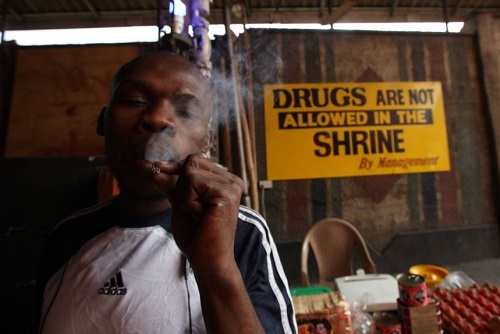AP photo
By
Abdulyassar Abdulhamid
Recently while having a fruitful discussion with my patron, a humble man of resourceful knowledge and tremendous experience, on what should be the future of our youths whose minds are carried away by drug abuse, football and trivialities, he asked me many unanswerable questions that are still troubling my mind. The one that has beaten my mind to a pulp among the array of questions he threw at me is: what should be the future of our society, especially of our youths, in the next twenty years or thereabouts? I was left speechless by this question, although I have often toyed with questions of this kind before. This has led to more searching questions: Will sheer laziness allow our youth to compete with their peers in other climes and free them from the shackles of poverty? This train of questions is endless. Will drug abuse give our youth a sense of good judgment? Should football, or games as a whole, give our youths that once-in-a-lifetime chance to compete with other societies?
If there is anything these days that unites our youth and gives them that strong bond that only blood can give to brothers. it is football. I was so surprised when I first found out that meetings take place in solidarity with other supporters abroad to celebrate Real Madrid, Barcelona, or Manchester United’s victory by people here who cannot produce commonplace secondary school leaving certificates. Football is the only umbrella under which our youths experience something called unification, perhaps embellishment, many analysts have argued. Youths can readily avoid their works or duties to grace the scattered viewing centers here and there in our communities. They love and hate for football’s sake. As literature (or rather scholarship is) to the West I fear football is gradually substituting religious institutions here. This may sound a lesser irresponsibility compared to what will come in the next few lines.
Drug abuse, which is the “habitual use of drugs not needed for therapeutic purposes, solely to alter one’s mood, affect, or state of consciousness, or to affect a body function unnecessarily (as in laxative abuse)” as defined by medical dictionary, is gradually becoming the order of the day. The youths nowadays take refuge in intoxicants arguably to avoid or replace their endless idleness. The most widely abused drugs and substances among the youths are: cough syrup, anti-allergy, caffeine pills, laxatives, painkillers, paint fumes, solvent, glue, marijuana, codeine, and even lizard droppings, among a host of others.
Recently there was a report released by the National Drugs Law Enforcement Agency (NDLEA) through its Kano State commander, Garba Ahmad, the most populous state in the country, topping the drugs/substances abuse chart in Nigeria. This, the report concludes, has become a social menace, and has a direct correlation with the high unemployment rate in the state with many factories closing due to an epileptic power supply.
According to the National Institute of Drug Abuse, drug abuse can lead to brain damage by flooding the brain circuits and dopamine (neurotransmitter that is responsible for storing, cognition, etc); and can also lead to physical injuries. This can be seen on the scarified faces and toothless mouths of most drug addicts.
Where do we begin? There is a need for urgent measures to be taken by all stakeholders, especially at all levels, parents, community leaders, clerics, schools, CBOs/NGSs, multi-lateral organizations, etc, to arrest this ugly situation for the future of humanity to be secured as drugs/substances abuse is a global problem, but with devastating consequences on developing countries. It is a collective responsibility as all hands must be on deck to bring a lasting solution to this socio-economic crisis. Families, traditional institutions and political institutions have failed us.
The family which is the first, principal social institution and center of social activity a person comes in contact with (which is considered the backbone of society) is no longer as effective as it used to be. Are parents, especially fathers, ready to shoulder their responsibilities? Are parents even aware of those responsibilities they are saddled with? Parents care more for bringing children into this world than giving them a proper upbringing; they do not bother to know their children’s whereabouts nor do they care to know with whom their children associate. This, no doubt, has given peer groups some advantages over the family and is why most victims of drug abuse are products of broken or violent families.
The traditional institutions that have their origin in pre-colonial Nigeria and were later incorporated into the British colonial (mostly indirect) rule especially in the northern region are no longer after their Talakawas (the masses); before they were well aware of who was or who was not on this or that street. But today they are, I suspect, more or less preoccupied with what they will get from the sale of a house or piece of land.
The political institutions that enact laws, apply them, mediate conflicts, represent the population, and initiate/implement policies for the overall socio-economic well-being of the overwhelming majority of the people have not kept up with their mandate. The state is a total failure. The masses have lost faith in them; they are not always there to give support to the common man.
Supported by the conviction that none of these institutions: family, traditional institutions, political institutions can do anything to improve the condition of their lives, the youths have drug abuse as a means of escaping from this world moving at a breakneck speed.
The religious institutions (the clerics) should use the wisdom they are endowed with to call these strayed youths, families, social institutions and political institutions to order and remind all the institutions of their responsibilities, for all laws are meant to preserve social organizations and cultures.
Where are we heading to? Our movement is directed to a cul-de-sac or a narrow blind alley with no way of escape; that will hardly open doors for more opportunities. This can neither favour the society nor its members that shape it with time. Potential manpower that should have been deployed elsewhere, if given rigorous, formal training, has ended up under chocking bridges, on heaps of garbage and filthy alleyways.
Abdulyassar Abdulhamid
Abdulyassar Abdulhamid, Kano based, is graduate of B.A English from Bayero University, Kano. He is a budding writer, social analyst, freelancer at Sunrise Language Practitioner (SLP) and regular contributor to Nigerian dailies.
His writings have appeared in The Communicator, a magazine published by Kano State Polytechnic and in Dailytrust, The Triumph and The cable newspapers. He has a strong interest in literary theory.



No Comments Yet!
You can be first to comment this post!